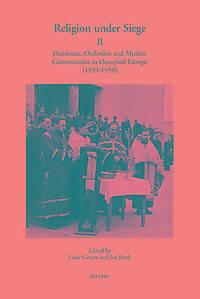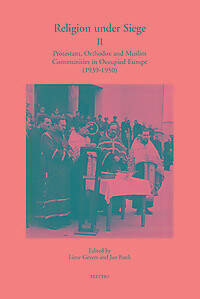
- Retrait gratuit dans votre magasin Club
- 7.000.000 titres dans notre catalogue
- Payer en toute sécurité
- Toujours un magasin près de chez vous
- Retrait gratuit dans votre magasin Club
- 7.000.0000 titres dans notre catalogue
- Payer en toute sécurité
- Toujours un magasin près de chez vous
Religion Under Siege II
'Protestant, Orthodox and Muslim Communities in Occupied Europe (1939-1950)'
Gevers L.//Bank J.
54,00 €
+ 108 points
Description
As is the case with a collection of studies on the Catholic Church published in another volume, the present collection represents results of a period of research undertaken within the framework of the research project of the European Science Foundation and entitled 'The Impact of National Socialist and Fascist Occupation in Europe' (1999-2005). Within this more inclusive project, research into the arena of Church and Religion was entrusted to Team 2 'The Continuity of the Churches'. Not only the Catholic Church but also the other Christian Churches, both Protestant and Orthodox, and to a certain degree Islam, were extremely significant actors in the complex relationship between accommodation, collaboration and resistance in occupied Europe during the Second World War. Historical research into Protestantism and Eastern Orthodoxy has led to a wide range of results and conclusions. Both Christian perspectives tend, for example, to exhibit more national features than the Roman Catholic Church, the latter being led from an international centre and being characterised by the endeavour to establish uniformity in spite of the existence of national differences. Such centralism was of little importance for Orthodoxy and of no importance whatsoever for Protestantism, both in its Lutheran and its Calvinist variants. In the present collection of essays, national variants with respect to Orthodoxy are presented in case studies on the Russian, Serbian and Greek Orthodox Church. Some authors focus on the ecclesiastical politics in religiously tense Ukraine and Bosnia. Further on, a number of contributions turn their attention to different dimensions of Protestantism in the Scandinavian countries, France, the Netherlands and Belgium. The volume wants to enhance the historical knowledge of the various attitudes maintained by the churches and religions in Europe during the Second World War. It will undoubtedly inspire further comparative research in the field.
Spécifications
Parties prenantes
- Auteur(s) :
- Editeur:
Contenu
- Nombre de pages :
- 284
- Langue:
- Anglais
- Collection :
Caractéristiques
- EAN:
- 9789042919334
- Date de parution :
- 01-12-07
- Format:
- Livre broché
- Format numérique:
- Trade paperback (VS)
- Dimensions :
- 155 mm x 318 mm
- Poids :
- 476 g

Les avis
Nous publions uniquement les avis qui respectent les conditions requises. Consultez nos conditions pour les avis.






